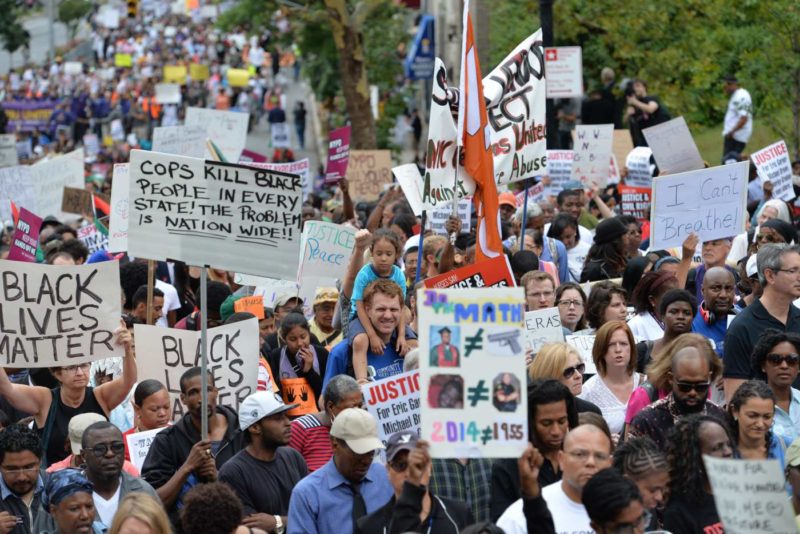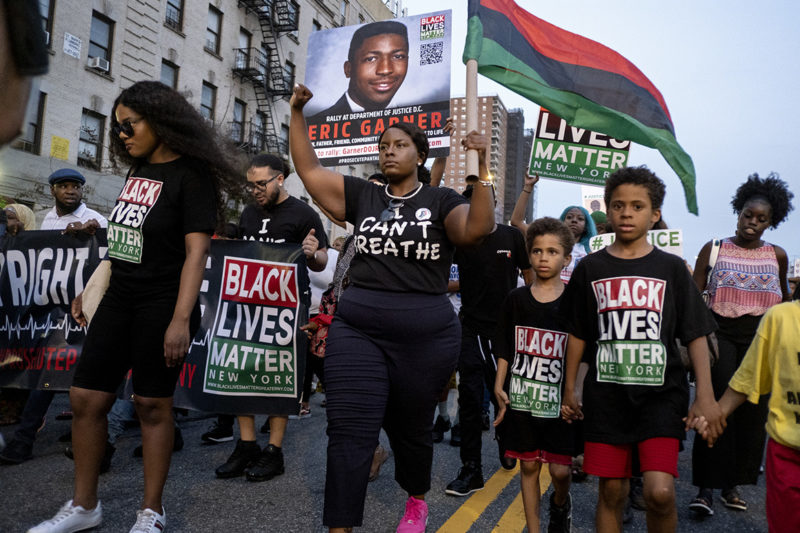Special News Series: Rising Up For Justice! – Black Lives Matter goes big on policy agenda
Share
Explore Our Galleries
Breaking News!
Today's news and culture by Black and other reporters in the Black and mainstream media.
Ways to Support ABHM?
Introduction To This Series:
This post is one installment in an ongoing news series: a “living history” of the current national and international uprising for justice.
Today’s movement descends directly from the many earlier civil rights struggles against repeated injustices and race-based violence, including the killing of unarmed Black people. The posts in this series serve as a timeline of the uprising that began on May 26, 2020, the day after a Minneapolis police officer killed an unarmed Black man, George Floyd, by kneeling on his neck. The viral video of Floyd’s torturous suffocation brought unprecedented national awareness to the ongoing demand to truly make Black Lives Matter in this country.
The posts in this series focus on stories of the particular killings that have spurred the current uprising and on the protests taking place around the USA and across the globe. Sadly, thousands of people have lost their lives to systemic racial, gender, sexuality, judicial, and economic injustice. The few whose names are listed here represent the countless others lost before and since. Likewise, we can report but a few of the countless demonstrations for justice now taking place in our major cities, small towns, and suburbs.

To view the entire series of Rising Up for Justice! posts, insert “rising up” in the search bar above.
Black Lives Matter goes big on policy agenda
The BREATHE Act is the centerpiece of the policy agenda activists are pushing after months of demonstrations over racial injustice.
By Maya King, Politico
August 28, 2020

After three months of sustained public protest, Black Lives Matter organizers are stepping from streets and plazas into the policy arena. And they’re going big.
The BREATHE Act, a four-part proposal named after the phrase uttered by Black men Eric Garner and George Floyd while in police choke holds, aims to codify the movement’s core objective: redirecting federal funds away from police, prisons and other parts of the criminal justice system and into underserved communities of color.
“I think that we’ve demonstrated over time that we have the rigor and the relationships and the expertise to truly generate meaningful ideas into public policy solutions,” said Jessica Byrd, a Democratic strategist and lead organizer of the Black National Convention, the virtual gathering of activists taking place Friday night. “And the BREATHE Act is the best and highest example of that.”
The policy document is set to take center stage at the Black National Convention, which aims to create “a vision for Black Lives before the biggest election of our time, and long after.” While its architects recognize it does not have the necessary backing on Capitol Hill — even in a Democratic-majority House — they argue it’s an important marker for activists as they seek to turn the momentum gained through a summer of protest into political wins. How far they go in building support will be a critical test of the movement’s enduring influence, post-George Floyd.
“Certainly, this is a moment politically where I think so many of us are trying to see where the rebellions in the streets will have impact on policy, platform and practice of the major political parties,” said Alicia Garza, a co-founder of Black Lives Matter. “And, you know, for us, I think the BREATHE Act really represents an opportunity to galvanize voters, particularly Black voters, in this election cycle.”
The BREATHE Act finds its roots in the 2016 policy platform called the Vision for Black Lives. It was drafted in response to the police killings of African Americans like Michael Brown, Sandra Bland and Philando Castile and called for a similar divest-invest approach to policing and public safety that Byrd said was often rebuffed “as this lofty, unviable set of ideas.”
But George Floyd’s death at the hands of a Minneapolis police officer catapulted the discussion over defunding the police into the mainstream and turned Black Lives Matter from a controversial topic into a household phrase. In the latest sign of its cultural significance, athletes across several professional leagues including the NBA, WNBA and MLB this week opted to break their contracts and sit out games and matches in a show of solidarity with anti-racism protesters.
The response has convinced Byrd and other organizers that the BREATHE Act also has the potential to go mainstream. She and others involved with the Black National Convention plan to highlight the proposal Friday as an example of the work organizers are doing not just to protest current injustices, but end them.
“What we want to tell folks is that in this moment, we are ripe for transformation. And we can build that and achieve that if we come together under a shared political vision that touches on policies around reproductive justice and housing and the criminal legal system which includes policing and the environment,” said Kayla Reed, executive director of the organizing group Action St. Louis and co-founder of the Movement for Black Lives’ Electoral Justice Project.
“We don’t have to just get one thing done,” Reed continued. “We can get it all done, because it’s what our communities deserve.”
The BREATHE Act’s terms go beyond criminal justice reform. The plan calls for funding for infrastructure that can withstand climate change-related disasters and federal grants to guarantee clean air and water for all communities. It also supports the passage of H.R. 40, which would establish a committee for the study of reparations; and calls for the expansion of existing health programs like Medicaid under the terms of the Affordable Care Act.
There have been some small signs of progress in building support for the proposal, which has yet to be formally introduced in Congress. When the Movement for Black Lives requested a meeting with the Congressional Black Caucus to present the BREATHE Act, Sen. Kamala Harris, stepped up to arrange it.
Sen. Cory Booker introduced a sweeping criminal justice reform bill in 2019 that would reduce mandatory minimums for drug offenses, reinstate the right to vote for the formerly incarcerated and expunge records for those with marijuana offenses. And in July, Patrisse Cullors, co-founder of Black Lives Matter, addressed the Democratic National Committee’s platform committee to encourage the party’s top brass to adopt the BREATHE Act as part of its platform.
Harris, now the party’s vice presidential nominee, has made no further commitment to backing the BREATHE Act, however. And the DNC did not adopt the proposal as part of the party platform, though it did include the phrase “Black lives matter” with the promise to study the impacts of slavery and Jim Crow-era segregation on current racial inequities. Booker’s bill is unlikely to make any progress in the current, Republican-held Senate.
Even in the Democrat-controlled House, the legislation is likely to face a frosty reception. Most Democrats in Congress have already rejected the idea of defunding the police. Democratic presidential nominee Joe Biden has proposed a $300 million investment in the COPS program, which would hire more police officers and require that their demographics mirror the communities they serve.
During a virtual panel hosted by UCLA’s Latino Policy and Politics Initiative in July, CBC Chair Karen Bass told POLITICO that elements of the BREATHE Act are already in existing legislation. However, parts of the sweeping proposal, she said, are “more challenging.”
“One of the main points of that bill is that it shows how you can cut federal spending and re-invest in communities and that concept, that principle is something I feel very strongly about,” Bass said. “The wholesale elimination of programs, I think, would be challenging.”
The legislation does, however, have the support of prominent progressives Democratic Reps. Ayanna Pressley of Massachusetts and Rashida Tlaib of Michigan, who plan to co-sponsor it. And organizers see a handful of new allies in young, Black progressives politicians such as New York’s Jamaal Bowman and Missouri’s Cori Bush, whose primary victories this summer all but assure them of seats in Congress in 2021.
To some organizers, Bowman and Bush’s election wins, which involved ousting older, moderate Democrats, are an important step forward for the young generation of activists seeking to shape policy at the local, state and federal levels.
Read the full article here.











Comments Are Welcome
Note: We moderate submissions in order to create a space for meaningful dialogue, a space where museum visitors – adults and youth –– can exchange informed, thoughtful, and relevant comments that add value to our exhibits.
Racial slurs, personal attacks, obscenity, profanity, and SHOUTING do not meet the above standard. Such comments are posted in the exhibit Hateful Speech. Commercial promotions, impersonations, and incoherent comments likewise fail to meet our goals, so will not be posted. Submissions longer than 120 words will be shortened.
See our full Comments Policy here.